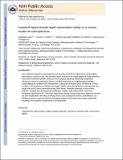| dc.contributor.author | Suh, Junghyup | |
| dc.contributor.author | Foster, David J. | |
| dc.contributor.author | Davoudi, Heydar | |
| dc.contributor.author | Wilson, Matthew A. | |
| dc.contributor.author | Tonegawa, Susumu | |
| dc.contributor.author | Foster, David J. | |
| dc.contributor.author | Wilson, Matthew A. | |
| dc.date.accessioned | 2016-05-25T15:08:43Z | |
| dc.date.available | 2016-05-25T15:08:43Z | |
| dc.date.issued | 2013-10 | |
| dc.date.submitted | 2013-09 | |
| dc.identifier.issn | 08966273 | |
| dc.identifier.issn | 1097-4199 | |
| dc.identifier.uri | http://hdl.handle.net/1721.1/102677 | |
| dc.description.abstract | The cognitive symptoms of schizophrenia presumably result from impairments of information processing in neural circuits. We recorded neural activity in the hippocampus of freely behaving mice that had a forebrain-specific knockout of the synaptic plasticity- mediating phosphatase calcineurin and were previously shown to exhibit behavioral and cognitive abnormalities, recapitulating the symptoms of schizophrenia. Calcineurin knockout (KO) mice exhibited a 2.5-fold increase in the abundance of sharp-wave ripple (SWR) events during awake resting periods and single units in KO were overactive during SWR events. Pairwise measures of unit activity, however, revealed that the sequential reactivation of place cells during SWR events was completely abolished in KO. Since this relationship during postexperience awake rest periods has been implicated in learning, working memory, and subsequent memory consolidation, our findings provide a mechanism underlying impaired information processing that may contribute to the cognitive impairments in schizophrenia. | en_US |
| dc.description.sponsorship | RIKEN Brain Science Institute | en_US |
| dc.description.sponsorship | Alfred P. Sloan Foundation (Fellowship) | en_US |
| dc.description.sponsorship | Brain & Behavior Research Foundation (NARSAD Young Investigator Award) | en_US |
| dc.description.sponsorship | National Institutes of Health (U.S.) (NIH grant MH78821) | en_US |
| dc.description.sponsorship | National Institutes of Health (U.S.) (NIH grant MH58880) | en_US |
| dc.description.sponsorship | National Institutes of Health (U.S.) (NIH grant MH086702) | en_US |
| dc.language.iso | en_US | |
| dc.publisher | Elsevier/Cell Press | en_US |
| dc.relation.isversionof | http://dx.doi.org/10.1016/j.neuron.2013.09.014 | en_US |
| dc.rights | Creative Commons Attribution-NonCommercial-NoDerivs License | en_US |
| dc.rights.uri | http://creativecommons.org/licenses/by-nc-nd/4.0/ | en_US |
| dc.source | PMC | en_US |
| dc.title | Impaired Hippocampal Ripple-Associated Replay in a Mouse Model of Schizophrenia | en_US |
| dc.type | Article | en_US |
| dc.identifier.citation | Suh, Junghyup, David J. Foster, Heydar Davoudi, Matthew A. Wilson, Susumu Tonegawa. "Impaired Hippocampal Ripple-Associated Replay in a Mouse Model of Schizophrenia." Neuron 80, (2013) pp. 484–493. | en_US |
| dc.contributor.department | Massachusetts Institute of Technology. Department of Brain and Cognitive Sciences | en_US |
| dc.contributor.department | Picower Institute for Learning and Memory | en_US |
| dc.contributor.department | RIKEN-MIT Center for Neural Circuit Genetics | en_US |
| dc.contributor.mitauthor | Suh, Junghyup | en_US |
| dc.contributor.mitauthor | Foster, David J. | en_US |
| dc.contributor.mitauthor | Wilson, Matthew A. | en_US |
| dc.contributor.mitauthor | Tonegawa, Susumu | en_US |
| dc.relation.journal | Neuron | en_US |
| dc.eprint.version | Author's final manuscript | en_US |
| dc.type.uri | http://purl.org/eprint/type/JournalArticle | en_US |
| eprint.status | http://purl.org/eprint/status/PeerReviewed | en_US |
| dspace.orderedauthors | Suh, Junghyup; Foster, David J.; Davoudi, Heydar; Wilson, Matthew A.; Tonegawa, Susumu | en_US |
| dspace.embargo.terms | N | en_US |
| dc.identifier.orcid | https://orcid.org/0000-0003-2839-8228 | |
| dc.identifier.orcid | https://orcid.org/0000-0001-7149-3584 | |
| mit.license | PUBLISHER_CC | en_US |
